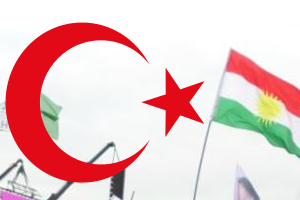Turkey’s Kurds and the Post-election Political Landscape
By Gareth Jenkins (vol. 8, no. 13 of the Turkey Analyst)
The Turkish general election of 7 June stripped the ruling Justice and Development Party (AKP) of its parliamentary majority for the first time since November 2002 and dealt a devastating blow to President Recep Tayyip Erdoğan’s hopes of replacing the country’s parliamentary system with an autocratic presidential one in which all political power was concentrated in his own hands. But, even though the election was an undoubted triumph for the pro-Kurdish Peoples’ Democratic Party (HDP), it has also left the Kurdish nationalist movement facing a number of challenges.

Values and Identity: the Resurgence of the Kurdish Hizbullah
By Gareth H. Jenkins (vol. 5, no. 9 of the Turkey Analyst)
On April 22, 2012, hundreds of thousands of people gathered in the center of Diyarbakır, the largest city in the predominantly Kurdish southeast of Turkey, for a celebration of the Prophet Muhammad’s birth. The event was organized by a coalition of NGOs affiliated with the radical Sunni Islamist organization known in Turkey as Hizbullah (which is unrelated to the Lebanese Shia organization with the same name), which many assumed to have been crippled by the killing of its founder Hüseyin Velioğlu in January 2000. However, Hizbullah’s ability to mobilize such a huge number of people suggests that it has not only recovered but is now stronger than ever. Its ability to combine a strong commitment to conservative Islamic values with an advocacy of Kurdish cultural and political rights looks set to pose a serious challenge not only to the ruling Justice and Development Party (AKP) but also to more secular Kurdish organizations such as the Peace and Democracy Party (BDP) and the militant Kurdistan Workers’ Party (PKK).
Reinventing a Broken Wheel: the AKP's New Kurdish Strategy
By Gareth H. Jenkins (vol. 5, no. 7 of the Turkey Analyst)
On 21 March 2012, Turkish government officials began briefing trusted journalists on what they described as the new strategy of the ruling Justice and Development Party (AKP) for solving the country’s long-running Kurdish problem. As more details emerged over the days that followed, it became clear that, far from raising hopes of future success, the AKP’s “new strategy” was more reminiscent of past failures; namely the discredited policies of denial and confrontation that had not only failed to resolve the Kurdish issue but had played a key role in boosting popular support for the violent insurgency of the Kurdistan Workers’ Party (PKK).
Turkey's New Constitution: a Last Change to Solve the Kurdish Issue?
By Gareth H. Jenkins (vol. 4, no. 19 of the Turkey Analyst)
On October 1, 2011, 25 deputies from the pro-Kurdish Peace and Democracy Party (BDP) and five pro-Kurdish independents were formally sworn in as members of the Turkish parliament, abandoning a three month-old boycott of the assembly in protest at the continued imprisonment of another five BDP candidates who had won seats in the June 12, 2011, general election. The ruling Justice and Development Party (AKP) had already announced that its priority over the months ahead will be the drafting of a new constitution. The decision by the thirty pro-Kurdish deputies to take up their seats in parliament has raised hopes of a sustained dialogue with the AKP and the possible inclusion in the new constitution of sufficient concessions to solve Turkey’s Kurdish problem and persuade the Kurdistan Workers’ Party (PKK) to lay down its arms. However, although the presence of the pro-Kurdish deputies in Ankara does create the opportunity for dialogue and a short-term reduction in tensions, there currently appears little prospect of the AKP agreeing to the Kurdish nationalists’ minimum demands.
Fading Hopes, Rising Demands: Kurdish Problem Moves Closer to the Point of No Return
By Gareth H. Jenkins (vol. 4, no. 13 of the Turkey Analyst)
In the general election of June 12, 2011, candidates backed by the pro-Kurdish Peace and Democracy Party (BDP) won 36 seats in Turkey’s 550-member unicameral parliament. On June 21, 2011, the Supreme Electoral Board (YSK) stripped Hatip Dicle, one of the successful BDP candidates, of his seat on procedural grounds. On June 23, the BDP announced that it would boycott parliament unless Dicle was reinstated. Over the days that followed, courts in the city of Diyarbakır blocked the release of another five successful BDP candidates. The decisions infuriated the BDP and further antagonized Turkey’s already deeply alienated Kurdish minority. Unless the Turkish government acts quickly, both the BDP’s civil disobedience campaign and the violent insurgency of the Kurdistan Workers’ Party (PKK) appear likely to escalate; with potentially devastating repercussions for Turkey’s social and political stability.


